PLAYING WITH FIRE ANALYSIS
So, how hot do you want it? Current heatwaves are harbingers of ‘the century of hell’
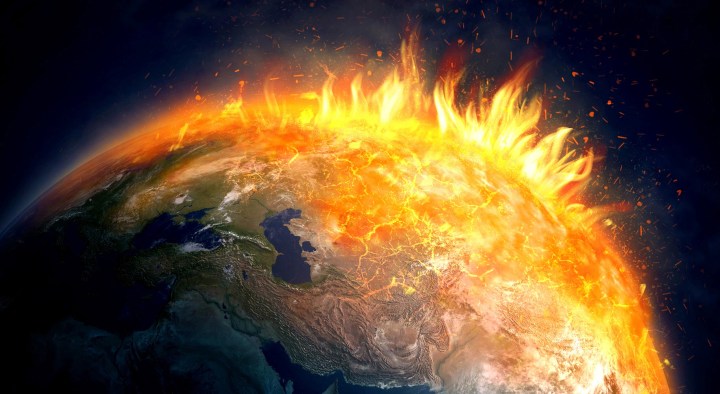
‘Each of us imposes some suffering on our future selves every time we flip on a light switch, buy a plane ticket or fail to vote. Now we all share the responsibility to write the next act. We found a way to engineer devastation, and we can find a way to engineer our way out of it.’ — David Wallace-Wells, ‘The Uninhabitable Earth, A Story of the Future’ (2019)
Once upon a time, not so long ago, the advent of summer used to usher in days of warmer but moderate temperatures; new leaves appeared, flowers blossomed and birds returned from an annual migration to warmer climes. Traditionally, Northern summers sparked romance and revival that was celebrated by our poets over the ages.
“We’re all going on a summer holiday,” sang Cliff Richard, speaking for a generation for which rising temperatures brought only good.
No longer.
When summer arrived in the Northern Hemisphere in 2022, it came with a bang.
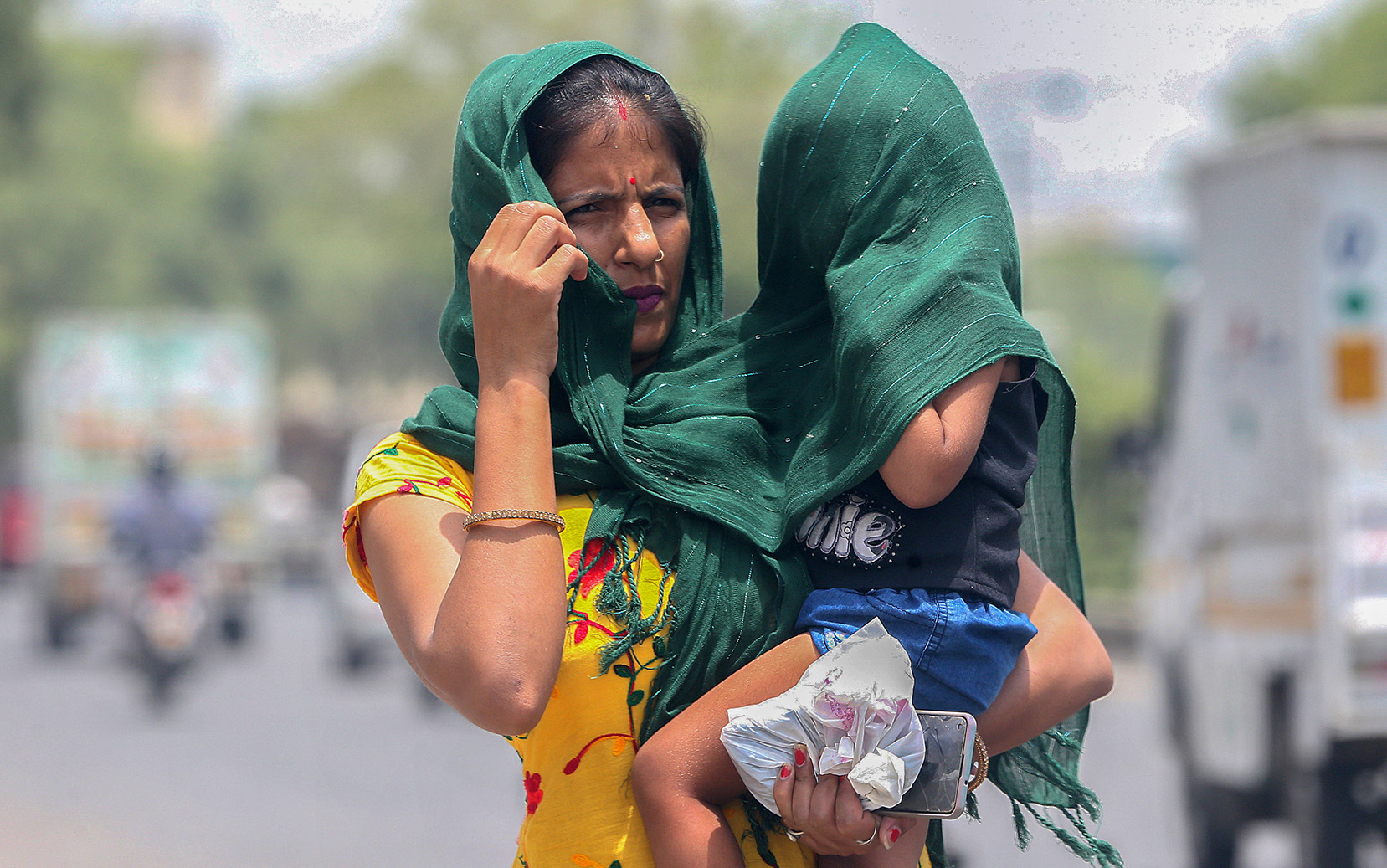
A woman holds her baby and covers her with a cloth to avoid the heatwave on the outskirts of New Delhi, India, on 19 May 2022. (Photo: EPA-EFE / Harish Tyagi)
This year, for the third or fourth year in a row, summer brought waves of often unbearable heat across Europe and the United States, as well as parts of India, China and Pakistan. It has exacerbated drought. Dried up rivers and dams. Unleashed wild and uncontrollable fires. In Pakistan, 33 million people have been displaced by floods, according to an article in Nature:
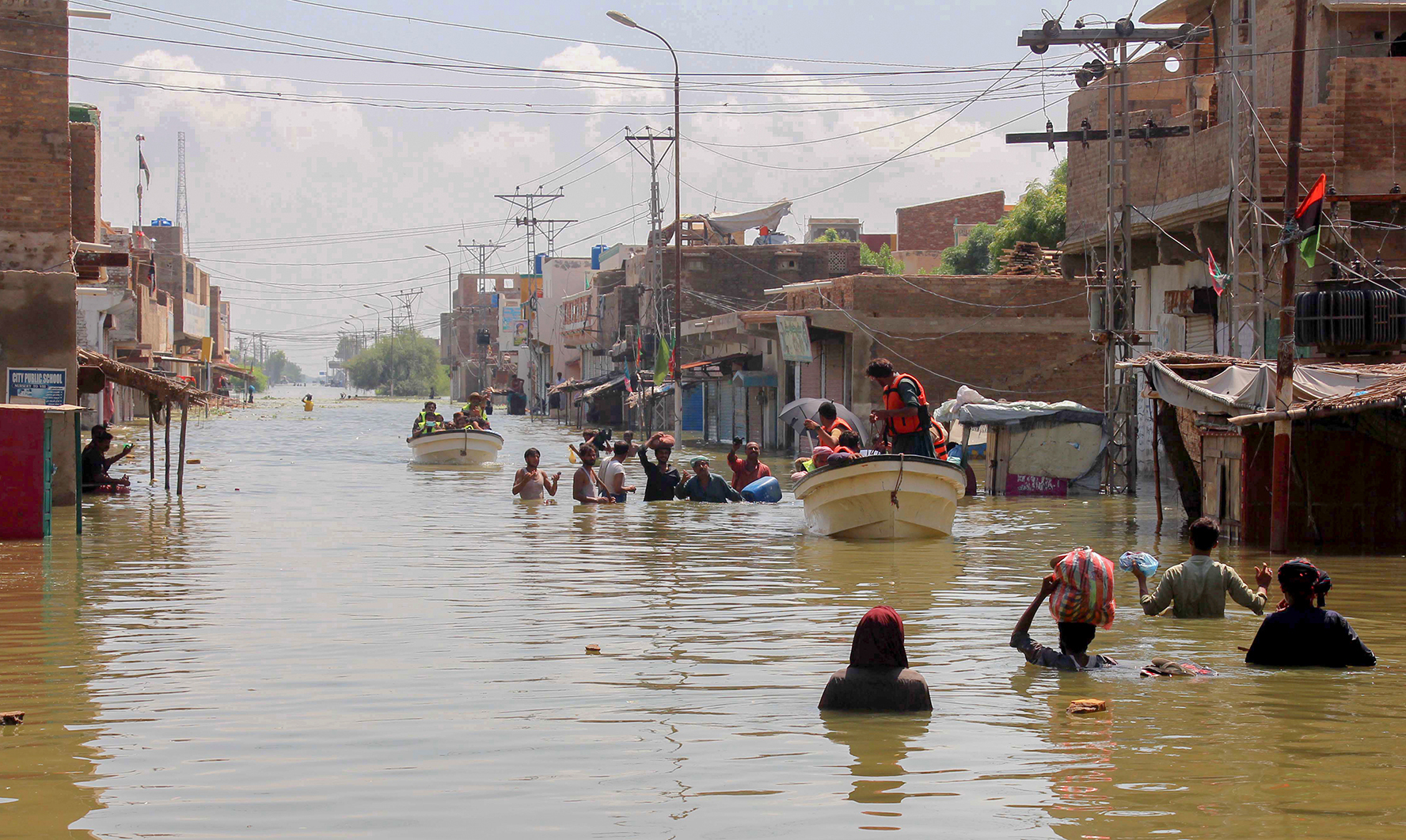
People affected by floods move to higher grounds in Khairpur Nathan Shah, Dadu district, Sindh province, Pakistan, on 2 September 2022. Flash floods triggered by heavy monsoon rains have swamped Pakistan since mid-June 2022. More than 33 million people have been affected by floods, the country’s climate change minister said. (Photo: EPA-EFE / Waqar Hussein)
“Researchers say the catastrophe probably started with phenomenal heatwaves. In April and May, temperatures reached above 40°C for prolonged periods in many places. On one sweltering day in May, the city of Jacobabad topped 51°C. ‘These were not normal heatwaves — they were the worst in the world. We had the hottest place on Earth in Pakistan,’ says Malik Amin Aslam, the country’s former minister for climate change, who is based in Islamabad.”
Not even Vladimir Putin’s war against Ukraine, which may already have killed tens of thousands of people, has been able to keep these manifestations of relentless global heating out of newspaper headlines.
Below are just a handful of descriptions:
Extreme heat around the world in videos, photos and graphics | Climate crisis | The Guardian
‘Avalanche of fires’: what the front pages around the world say | Wildfires | The Guardian
Europe’s worst ever drought: in pictures | Environment | The Guardian
Heatwave in China is the most severe ever recorded in the world | New Scientist
In that not-so-distant past, heatwaves like these generated blips of debate on whether they could be attributed to global warming. It seems we have passed that point. Today, nobody in their right mind — and fewer and fewer in their wrong minds — disputes the causality between carbon emissions and rising summer temperatures.
Read in Daily Maverick: “The fingerprints of climate change are all over Europe’s heatwaves and wildfires”
Instead, with reports of several thousand deaths due to heat in Portugal, Spain and England and thousands due to flooding in Pakistan, commentators are beginning to focus on other crises that the baking temperatures will trigger.
As usual, women and children will be the first to bear the brunt.
See for example: How climate change could drive an increase in gender-based violence
In developed countries, experts are also beginning to provide advice on how individuals can act to protect themselves from heat:
Body shock: six ways the heat affects the human body | UK weather | The Guardian
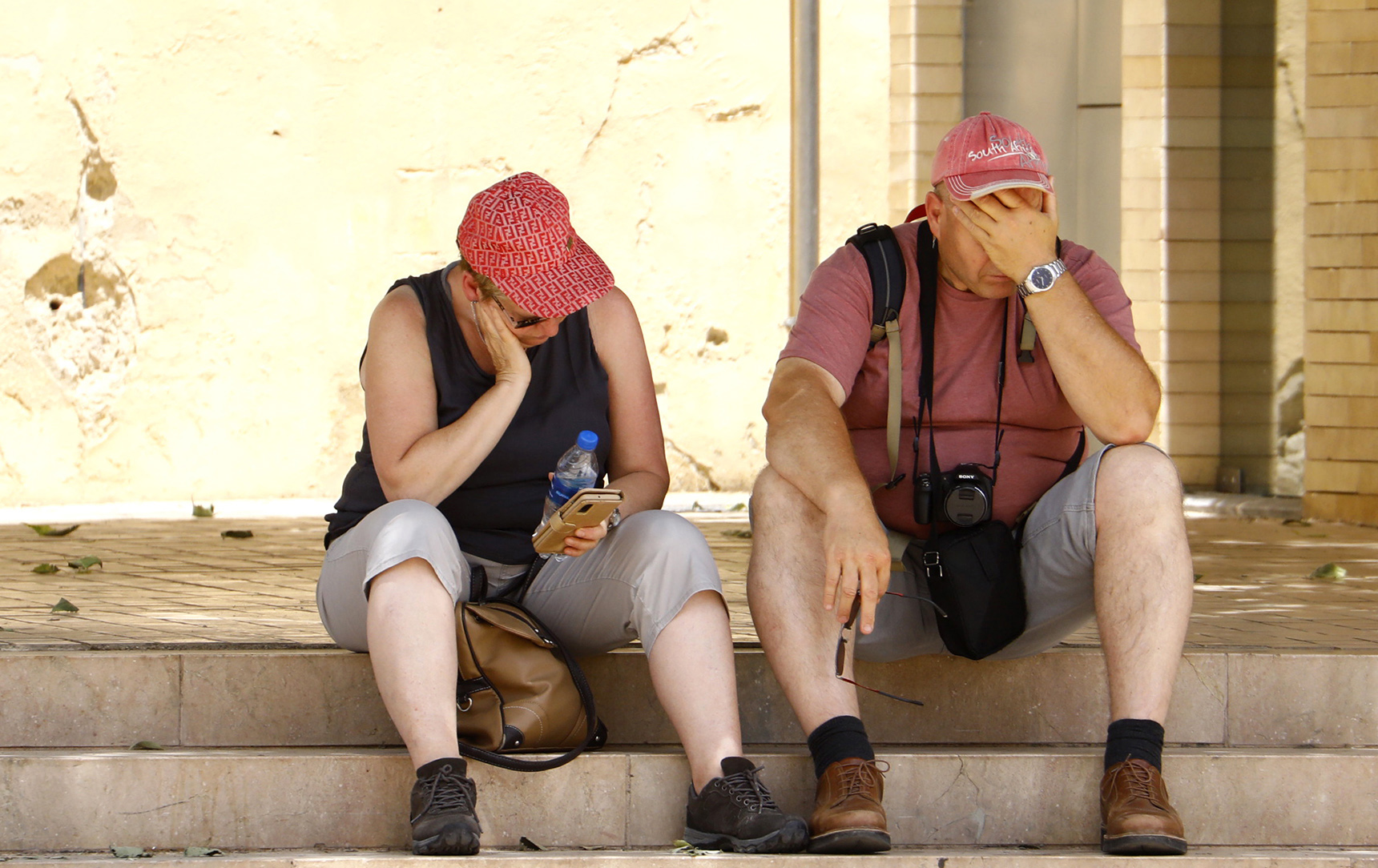
Tourists take a rest in downtown Cordoba, Spain, 16 June 2022. The State Meteorological Agency activated the orange alert for high temperatures in the provinces of Cordoba and Jaen and yellow in the regions of Seville, Granada and Almeria. (Photo: EPA-EFE / SALAS)
The problem, though, is that in telling the news, a large part of the media still presents what we are seeing as almost inevitable. That it’s “natural” — which it is and it isn’t. They imply all we can do is hunker down and adapt. Their reports rarely join the dots between cause and effect and so overlook the changes societies can still make to avoid being roasted.
File “carbon profits” under business news.
File “global heating” under human interest.
Portents and portals
As we, the people of South Africa, observe the Northern summer from afar, we should not be made complacent by our relatively cool and wet recent summers, for which we can thank the La Nina phenomena. We may not (yet) be baking, but let’s not forget the recent rain bomb over eThekwini or the cyclones off the coast of Mozambique.
Heat works in lots of ways, paradoxically even causing cold and rain.
Rich white people eating strawberries in the heatwave during Wimbledon may feel a world away, but we should nonetheless be thinking deeply about what Europe’s fiery summer bodes for us and the world.
How hot will it get?
One question we probably ought to ask as we watch the records break is, “how much hotter can it get?”
To which the answer is: “Well, how much hotter do you want it?”
Because it can get a lot, lot, lot hotter.
In his 2019 book, The Uninhabitable Earth, A Story of the Future, David Wallace-Wells documents what the world will look like at 2, 3, 4 and 8 degrees warming. It’s scary reading… imagine “the Alps as arid as the Atlas mountains”.
David Wallace-Wells (follow him on Twitter) quotes journalists who, on the basis of scientific studies, predict that global heating will make the 22nd century “the century of hell”.
But judging by the present, we may not need to wait another 78 years for hell to arrive. It’s coming to a suburb near you. Soon.
Wallace-Wells asks: “How much hotter will it get?” and in answer to his own question, puts it this way:
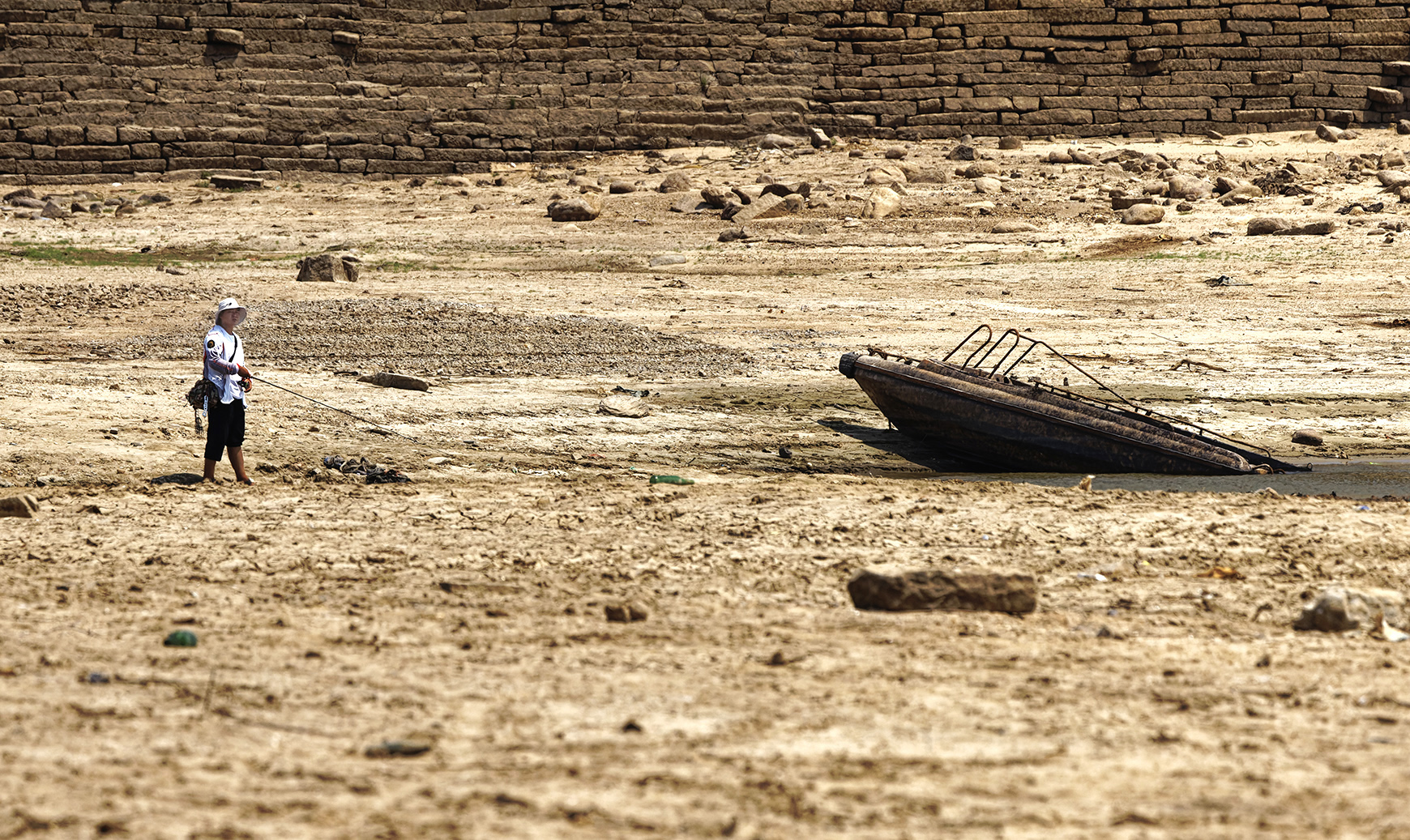
A man fishes in a puddle of the dried Poyang Lake, Jiangxi Province, China, 24 August 2022. Severe drought exposed the ancient Luoxingdun stone island in the middle of dried Poyang Lake in East China. It was the first time in 71 years that the historic island could be fully seen. (Photo: EPA-EFE / Alex Plavevski)
“… the answer is almost entirely human — which is to say political… how much more carbon we decide to emit is not a question for the natural sciences but the human ones.
“It has become commonplace among climate activists to say that we have, today, all the tools we need to avoid catastrophic climate change — even major climate change. It is also true. But political will is not some trivial ingredient, always at hand.”
Political will. There’s the genie we can’t rub out of the lamp. Unfortunately, political will is not something scientists can conjure up or predict.
Yes, we can. No, we won’t
The truth is that with political will, there is still much that could be done to limit global heating.
You can find out how in any good book store. Observant readers may have noticed that in the 2020s, what I call “world-help” books are becoming as dime a dozen as the self-help ones were a decade ago (and still are).
For example, in How to Spend a Trillion Dollars, The Ten Global Problems We Can Actually Fix (2021), Rowan Hooper, a senior editor at the New Scientist magazine, has a chapter titled “Go Carbon Zero”. In it he approvingly quotes Mark Jacobson, the director of the Atmosphere/Energy programme at Stanford University, as saying that “there is no technical or economic barrier to transitioning the world to 100% renewable energy at a low cost.
“His study found that by 2050 the cost of renewable energy is 75% less than fossil fuels, mainly because we avoid the health costs associated with air pollution.”
Visit Daily Maverick’s home page for more news, analysis and investigations
Therefore, with his imaginary trillion dollars, Hooper proposes spending $860-billion on renewable energy capacity. He says this is because “there is no more pressing mission facing humanity than avoiding catastrophic climate change, by which I mean avoiding more than two degrees of warming”.
He details the benefits that will accrue, but also asks: “If there is no technical or economic barrier, how do we do it?” To which he answers, “the barrier is political, at every level”.
Political will, again.
Sympathy with the devil: You pay, they play
While our politicians fiddle, the earth burns and the costs to civilisation are mounting daily.
Daily Maverick recently reported on a study published in the journal Climate Change which showed that “five national emitters of greenhouse gases generated $6-trillion in global economic losses from 1990 to 2014”.
The authors of the study also told Daily Maverick that “South Africa has caused $144.7-billion in damages to other countries, considering its territorial emissions from 1990-2014.
“The countries that South Africa has damaged are generally in the Global South, with already warm temperatures that have their economies more restricted with warming.”
So, check your xenophobia — our emissions have made other African countries unfarmable.
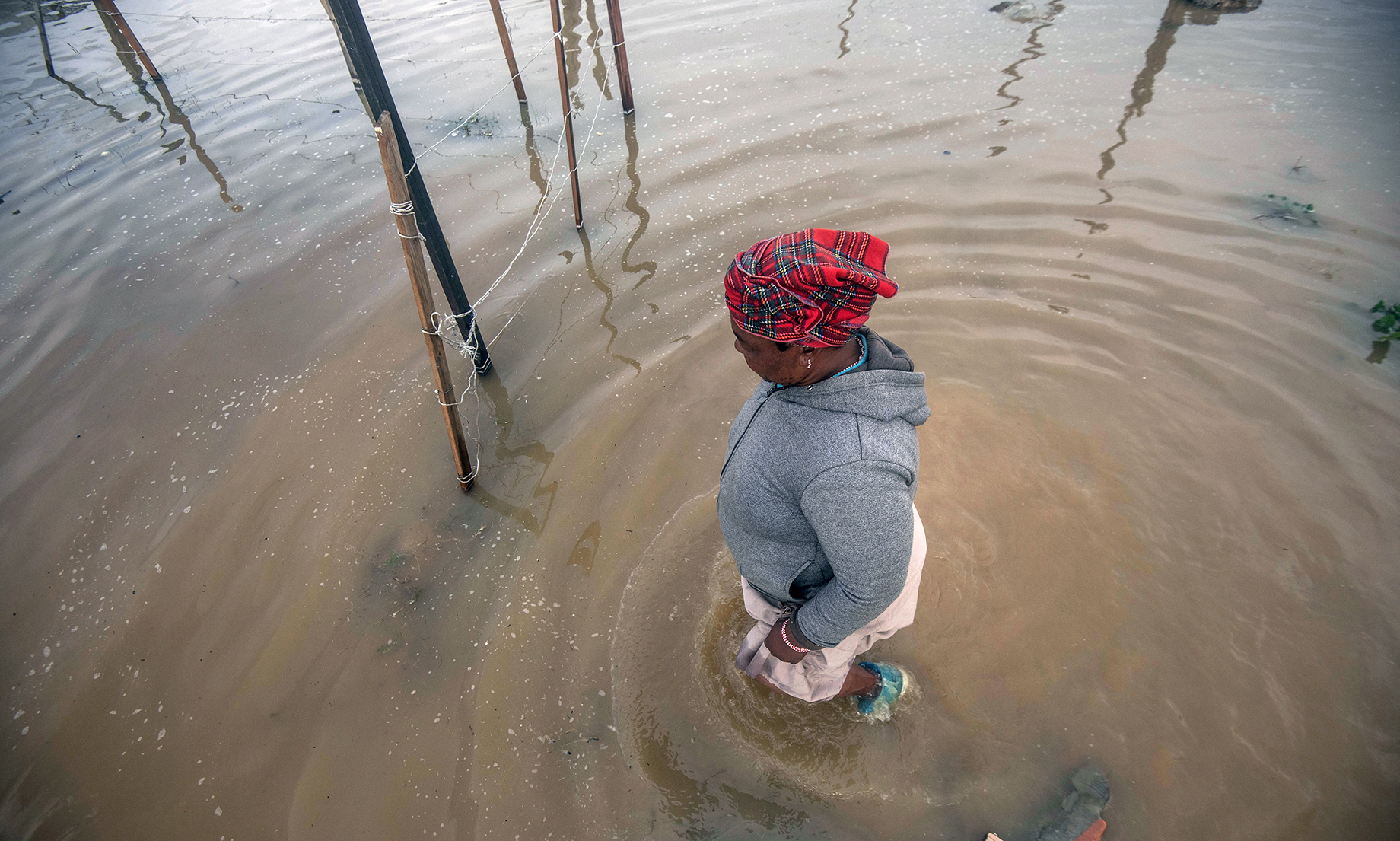
People fetch their belongings from their flooded homes at an informal settlement in Bloekombos, Kraaifontein in Cape Town on 1 July 2021. (Photo: Gallo Images / Brenton Geach)
The real problem is that the political paralysis is only a symptom of our capture (again) by powerful economic interests who are intent on preserving the status quo — until it explodes. Even as the costs accumulate for governments and taxpayers, there’s great profit in debilitation for the fossil fuel industry and for the arms industry — those terrible conjoined twins.
As if to prove the point, Total recently announced staggering second quarter profits of $5.7-billion to its shareholders.
But that’s par for the course. The Guardian has put a figure on how much profit the oil industry makes — $3-billion a day:
Earlier this year, bosses from the $2-trillion-a-year arms industry were caught licking their lips at the prospect of the Ukraine war. For the same reasons, they are salivating at the profits the industry will reap from climate wars — blood-profit it has already tasted from the uncivil war in Syria (in many respects, a proxy war — just like Ukraine’s).
These are the reasons why a 16-year-old winner of a New York Times “invent-a-word” competition coined “oblivionaire” — to fill a gap she saw in the English language. It means “a billionaire who chooses to be blind to the disparity and inequality that his wealth is creating”.
We should add “and blind to the destruction of global heating” to that definition.
Death capitalism
What we are living through is what science fiction writer Kim Stanley Robinson, in his celebrated novel Ministry for the Future, has called “death capitalism”.
In an article earlier this year, the word I chose to describe the collision of the climate crisis and political inaction by governments was “democide”, defined as “the killing of members of a country’s civilian population as a result of its government’s policy, including by direct action, indifference and neglect”.
Read more in Daily Maverick: “Charge those responsible for death by global heating with ‘Democide’ ”
Fortunately, in some countries, voters are beginning to fight back against the climate denialists.
This brings us back to the question of democracy and whether we want it or not. Actually, the “to be or not to be” question is whether we use democracy now to create that AWOL political will — or lose it to the creep of authoritarianism that is spreading over our world, as documented by organisations like Freedom House, Civicus and others.
Time is running out.
Get ready for more rude disruptions
Halfway through The Uninhabitable Earth, David Wallace-Wells rudely interrupts the reader.
“IF YOU HAVE MADE IT THIS FAR, YOU ARE A BRAVE READER. Any one of these 12 chapters contains, by rights, enough horror to induce a panic attack in even the most optimistic of those considering it. But you are not merely considering it; you are about to embark on living it. In many places, you already are.”
That was written in 2019. Nobody has fundamentally contradicted Wallace-Wells’ thesis, and much of what has happened since then seems in keeping with his science-based prophecies.
Some go even further, for example, The Inconvenient Apocalypse, published last week.
Parts of the earth are already becoming uninhabitable. Recently, a lecture at Wits University by respected philosopher Achille Mbembe was titled, Notes on Planetary Habitability.
Mbembe thinks that “we have all finally come to the realisation that there needs to be a significant adjustment to how we conduct our lives and to acknowledge that parts of the world will be entirely inhospitable to humans”.
But have we?
Mbembe suggests that every person asks themselves how they can share the earth among themselves and other complex life forms. “We can’t waste time with the usual partitioning and divisions. Repairing it as a whole, together, is a precondition for human durability.”
Scientists like Mbembe have already seen the future… and it doesn’t work.
That is, unless you are willing to batten down the hatches, turn up the air conditioning and move into Mark Zuckerberg’s Metaverse. Or if you prefer to be part of the (attempted) survival of the richest, start saving for a seat in a rocket fleeing to Mars with the noxious Elon Musk.
Make-your-mind-up-time is now.
Judging by what’s happening in the summer of 2022 (watch the soaring methane index), my gut is telling me that we will hit climate “tipping points” much earlier than expected and, as we do, a period of incremental and insufficient change will give way to an emergency — to which governments will respond in much the same way they did to the Covid pandemic.
Get ready for the great lockdown.
You may be feeling like you’ve never had it so bad, and you’re right. But global heating will exacerbate every existing crisis and make it worse.
We should be afraid.
The challenge now is how to create urgency, yet not to create panic and fear; how to use hope to galvanise solidarity, innovation and take back control.
In this regard, we can learn lessons from how activists responded to Aids in the days before we understood HIV, and eventually built a global movement that took on big pharma and Aids denialists and saved more than 35 million lives globally.
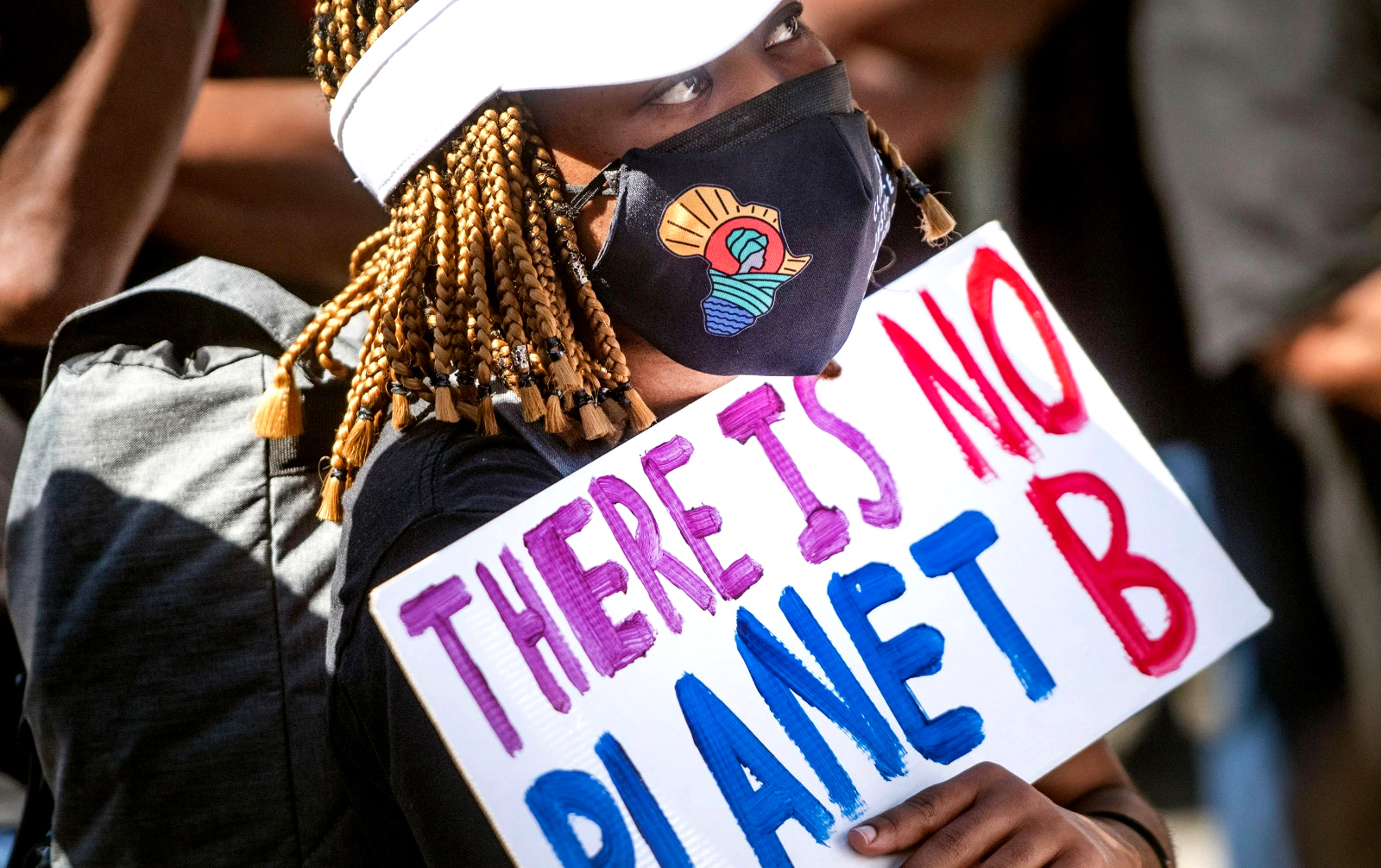
Activists protest outside Parliament for climate justice on 9 November 2021 in Cape Town. (Photo: Gallo Images / Brenton Geach)
It’s not too late, but if you find you are still not prepared to take action on climate change, then do something for your children — at least listen to them.
As young Fridays for Future activists say on their placards, “We have no Planet B”.
Truth be told, there is no choice but to end the era of “death capitalism” and to seize power using the best system humans have yet invented to assert control over the elites — democracy. DM/MC/OBP





















 Become an Insider
Become an Insider
What a sensible but frightening article!
Brilliant article, and it’s helped crystallize my thinking on this. Much of the ‘sustainable’ measures being taken nowadays are just ways to prolong the status quo. Recycling should have become the norm long ago. It’s not enough. Even the much vaunted ‘circular economy’ is hampered by the perception that it needs to allow shareholders to earn dividends that they can salt away for their and their children’s benefit. As long as that remains, it can never be truly circular. When you boil it all down, the root cause of the current problems is our species and its greed and selfishness. We live in a constrained system and for millennia hadn’t bumped up against the boundaries. Now we have. unless we find a safer, fairer way to live and work together, we’re all doomed to extinction along with all the other species on our planet.
The only conclusion I can draw is that we need some sort of social democracy with strong self imposed limits in place. The world’s left have been saying this for years, but every attempt we made to follow that road has been hijacked by selfish nationalism. Communism is a dirty word because dictators like Stalin, Mao etc traduced it. Consider the ANC in this country. It clothed itself in socialist camouflage, but I believe it never was truly socialist. The whole thing was a smokescreen for local elites to wrest ownership from the old European elites, and they successfully conned their supporters into believing that their interests would be taken into account.
Hello Steve, How are you? Great opinion. Spot on the nail. You have summed it up perfectly.
Wind flows have been very unusual over the past three years, and the el nina effect, hanging around for the same period have driven an epoch of extraordinary weather that Mark Heywood attributes to global warming, but experts far more knowledgeable on the subject than I, and immeasurably more knowledgeable than Mark, have looked at these wind patterns and found little or no correlation to global warming.
So lesson number 1, is hysteria is counter-productive, and blithely blaming “them” is unhelpful and alienating “them”, who we need to resolve the issue, is just plain daft as we need “them” more than ever.
We have all gained, yes unequally, from the extraordinary gains made over the 20th century, and we have “celebrated” our gains in a myriad different ways, the 1st World with conspicuous consumerism, and the 3rd World with exuberant reproduction that has seen the World’s population catapault beyond 10 billion when throughout history it had bumbled along at about the billion mark.
This has crushed flora and fauna – other than those which support human life – and destroyed every other species – if we think it is bad, imagine being any other species and beholden to selfish Man who has destroyed almost all over the last century?
Make no mistake, it is the increase in the numbers of humans that is the root cause of all our ills.
Can we get ourselves out of this deep hole? Yes, but it is going to require a ruthless change in the selfishness of Mankind.
Overall a good piece Jon. But I wouldn’t limit conspicuous consumption to the 1st world.
Brilliant, horrifying piece.
Not worth a comment really, not from me anyway.
I can only say: uncurbed population growth, overcrowding, overdevelopment.
while I agree with most of this, I disagree with the sentiment at the end. We are not in trouble because of “death” capitalism, nor is democracy and activism the solution. Vast populations have never had capitalism or democracy or freedom of association and never will. Right now it is technology and capitalism that is creating the tools for getting out of trouble. Solar and battery technology means that it already makes capitalist sense to run a solar plus storage plant that offers 20h a day dispatchable energy for cheaper than coal and a quarter of diesel. I make money with solar at my factory. The fact that I irritate a bunch of fossilheads is a bonus. As a capitalist I use EV because it is cheaper than ICE vehicles in the long run. We can sit in a circle, hold hands and chant khumbaya feel good stories as much as we want : world energy systems will only change when they make business sense. Fortunately they do now make sense.
As I read the article I can only agree that the earth is in serious trouble. I would like to read an intelligent analysis / depiction of how we need to be living in order to reduce our emissions. Should we all be physically MANUALLY be digging and growing our own food, stop all activities that all the negative consequences for the planet, no planes, tractors, trucks, cars, etc. In other words reverting to a subsistence way of life entirely ?
I have not seem any writings on the above, but only scary stories of how the future looks. Or is the way of life so scary that no one wants to be told about it ?
Beefbaron:
I’ll give you my perspective on a factory complex involving 600 workers and peak electrical demand of 500-600 kVA. We are already not far off generating as many MWh per year as we consume but timing is an issue. The generation part is a no-brainer financially and environmentally. For various reasons (punitive tariff schemes and load shedding) I am now close to adding enormous storage and about another ½ MW of solar. What that will give me is that I could (with help of gennies about 100h a year) take the entire factory off-grid. I prob won’t and will just keep a small grid connection. We don’t need to go back to the Stone Age to be 95% less coal electricity. Technology and costs have combined at the right time.
Agree with this. The hard bit is not accepting that our (my) way of life is negatively impacting on this dire situation, but where to focus my energies on reducing this impact; electricity, fossil fuels, vegetarianism, plastics, re-use, re-cycle? What actually are the biggest impacts I can make, or are we being penny wise pound foolish here with all these little bits we try and do in our own lives?
Does anyone read DM?
Moderating comments, 4 hours later and still no moderation.
Therefore one must assume, in the same way global warming stats are produced, that nobody reads DM articles
Humans are the problem, and there are simply too many of them and they are greedy creatures. What we need is a significant decrease in the global population. The Capitalist world works very much like a pyramid scheme. Without an ever growing consumer base many businesses will die off. There are a growing number of elites and they are all chasing the dream and wanting ever increasing portions of a limited size pie. I believe the industrial revolution was the start of our modern day problems and global warming. Interestingly enough, the undeveloped world, mainly Africa was the last to embrace Developed world concepts such as capitalism and democracy. Yet Africa contributes the least to the affects of global warming. I am by no means anti democratic, but I see democracy failing more and more everyday on a global basis. Its possible that humans are not a very clever species, since they can’t see themselves as contributing to their own self destruction. I cant see them making any defining changes to the troubles that face us, through the democratic process. We are definitely evolving as a species to a point of no return and ultimate extinction.
Malcolm, maybe our extinction will be the saviour of the planet. I recall hearing an American stand-up comedian, George Carlin’ doing a piece (does get scatalogical at times) maybe not centred around the problem being discussed here. But he touches on your point when he says, and I don’t quote literally, that the planet’s not effed, we’re effed.